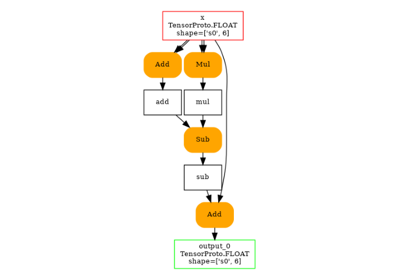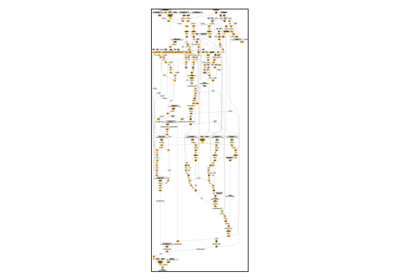Note
Go to the end to download the full example code.
Use DYNAMIC or AUTO when dynamic shapes has constraints¶
Settings the dynamic shapes is not always easy. Here are a few tricks to make it work.
dx + dy not allowed?¶
import torch
class Model(torch.nn.Module):
def forward(self, x, y, z):
return torch.cat((x, y), axis=1) + z[:, ::2]
model = Model()
x = torch.randn(2, 3)
y = torch.randn(2, 5)
z = torch.randn(2, 16)
model(x, y, z)
print(torch.export.export(model, (x, y, z)).graph)
graph():
%x : [num_users=1] = placeholder[target=x]
%y : [num_users=1] = placeholder[target=y]
%z : [num_users=1] = placeholder[target=z]
%cat : [num_users=1] = call_function[target=torch.ops.aten.cat.default](args = ([%x, %y], 1), kwargs = {})
%slice_1 : [num_users=1] = call_function[target=torch.ops.aten.slice.Tensor](args = (%z,), kwargs = {})
%slice_2 : [num_users=1] = call_function[target=torch.ops.aten.slice.Tensor](args = (%slice_1, 1, None, None, 2), kwargs = {})
%add : [num_users=1] = call_function[target=torch.ops.aten.add.Tensor](args = (%cat, %slice_2), kwargs = {})
return (add,)
Everything is fine so far. With dynamic shapes now. dx + dy is not allowed…
batch = torch.export.Dim("batch")
dx = torch.export.Dim("dx")
dy = torch.export.Dim("dy")
try:
dz = dx + dy
raise AssertionError("able to add dynamic dimensions, please update the tutorial")
except NotImplementedError as e:
print(f"unable to add dynamic dimensions because {type(e)}, {e}")
unable to add dynamic dimensions because <class 'NotImplementedError'>, Attempted to add Dim('dy', min=0) to dx, where an integer was expected. (Only increasing linear operations with integer coefficients are supported.)
Then we could make it a different one.
ExportedProgram:
class GraphModule(torch.nn.Module):
def forward(self, x: "f32[s35, s16]", y: "f32[s35, s43]", z: "f32[s35, 2*s55]"):
# File: ~/github/experimental-experiment/_doc/recipes/plot_exporter_exporter_dynamic_shapes_auto.py:19 in forward, code: return torch.cat((x, y), axis=1) + z[:, ::2]
cat: "f32[s35, s16 + s43]" = torch.ops.aten.cat.default([x, y], 1); x = y = None
slice_1: "f32[s35, 2*s55]" = torch.ops.aten.slice.Tensor(z); z = None
slice_2: "f32[s35, s55]" = torch.ops.aten.slice.Tensor(slice_1, 1, None, None, 2); slice_1 = None
add: "f32[s35, s16 + s43]" = torch.ops.aten.add.Tensor(cat, slice_2); cat = slice_2 = None
return (add,)
Graph signature:
# inputs
x: USER_INPUT
y: USER_INPUT
z: USER_INPUT
# outputs
add: USER_OUTPUT
Range constraints: {s35: VR[0, int_oo], s16: VR[0, int_oo], s43: VR[0, int_oo], 2*s55: VR[0, int_oo], s55: VR[2, int_oo]}
That works. We could also use
torch.export.Dim.DYNAMIC or torch.export.Dim.AUTO
for the dimension we cannot set.
DYNAMIC = torch.export.Dim.DYNAMIC
ep = torch.export.export(
model,
(x, y, z),
dynamic_shapes={
"x": {0: DYNAMIC, 1: dx},
"y": {0: DYNAMIC, 1: dy},
"z": {0: DYNAMIC, 1: DYNAMIC},
},
)
print(ep)
ExportedProgram:
class GraphModule(torch.nn.Module):
def forward(self, x: "f32[s35, s16]", y: "f32[s35, s43]", z: "f32[s35, s23]"):
#
sym_size_int_1: "Sym(s16)" = torch.ops.aten.sym_size.int(x, 1)
sym_size_int_2: "Sym(s43)" = torch.ops.aten.sym_size.int(y, 1)
sym_size_int_3: "Sym(s23)" = torch.ops.aten.sym_size.int(z, 1)
# File: ~/github/experimental-experiment/_doc/recipes/plot_exporter_exporter_dynamic_shapes_auto.py:19 in forward, code: return torch.cat((x, y), axis=1) + z[:, ::2]
cat: "f32[s35, s16 + s43]" = torch.ops.aten.cat.default([x, y], 1); x = y = None
#
add_1: "Sym(s16 + s43)" = sym_size_int_1 + sym_size_int_2; sym_size_int_1 = sym_size_int_2 = None
add_2: "Sym(s23 + 1)" = 1 + sym_size_int_3; sym_size_int_3 = None
floordiv: "Sym(((s23 + 1)//2))" = add_2 // 2; add_2 = None
eq: "Sym(Eq(s16 + s43, ((s23 + 1)//2)))" = add_1 == floordiv; add_1 = floordiv = None
_assert_scalar_default = torch.ops.aten._assert_scalar.default(eq, "Runtime assertion failed for expression Eq(s16 + s43, ((s23 + 1)//2)) on node 'eq'"); eq = _assert_scalar_default = None
# File: ~/github/experimental-experiment/_doc/recipes/plot_exporter_exporter_dynamic_shapes_auto.py:19 in forward, code: return torch.cat((x, y), axis=1) + z[:, ::2]
slice_1: "f32[s35, s23]" = torch.ops.aten.slice.Tensor(z); z = None
slice_2: "f32[s35, ((s23 + 1)//2)]" = torch.ops.aten.slice.Tensor(slice_1, 1, None, None, 2); slice_1 = None
add: "f32[s35, s16 + s43]" = torch.ops.aten.add.Tensor(cat, slice_2); cat = slice_2 = None
return (add,)
Graph signature:
# inputs
x: USER_INPUT
y: USER_INPUT
z: USER_INPUT
# outputs
add: USER_OUTPUT
Range constraints: {s35: VR[2, int_oo], s16: VR[0, int_oo], s43: VR[0, int_oo], s23: VR[2, int_oo]}
The same result can be obtained with torch.export.Dim.AUTO.
AUTO = torch.export.Dim.AUTO
print(
torch.export.export(
model,
(x, y, z),
dynamic_shapes=({0: AUTO, 1: AUTO}, {0: AUTO, 1: AUTO}, {0: AUTO, 1: AUTO}),
)
)
ExportedProgram:
class GraphModule(torch.nn.Module):
def forward(self, x: "f32[s35, s16]", y: "f32[s35, s43]", z: "f32[s35, s23]"):
#
sym_size_int_1: "Sym(s16)" = torch.ops.aten.sym_size.int(x, 1)
sym_size_int_2: "Sym(s43)" = torch.ops.aten.sym_size.int(y, 1)
sym_size_int_3: "Sym(s23)" = torch.ops.aten.sym_size.int(z, 1)
# File: ~/github/experimental-experiment/_doc/recipes/plot_exporter_exporter_dynamic_shapes_auto.py:19 in forward, code: return torch.cat((x, y), axis=1) + z[:, ::2]
cat: "f32[s35, s16 + s43]" = torch.ops.aten.cat.default([x, y], 1); x = y = None
#
add_1: "Sym(s16 + s43)" = sym_size_int_1 + sym_size_int_2; sym_size_int_1 = sym_size_int_2 = None
add_2: "Sym(s23 + 1)" = 1 + sym_size_int_3; sym_size_int_3 = None
floordiv: "Sym(((s23 + 1)//2))" = add_2 // 2; add_2 = None
eq: "Sym(Eq(s16 + s43, ((s23 + 1)//2)))" = add_1 == floordiv; add_1 = floordiv = None
_assert_scalar_default = torch.ops.aten._assert_scalar.default(eq, "Runtime assertion failed for expression Eq(s16 + s43, ((s23 + 1)//2)) on node 'eq'"); eq = _assert_scalar_default = None
# File: ~/github/experimental-experiment/_doc/recipes/plot_exporter_exporter_dynamic_shapes_auto.py:19 in forward, code: return torch.cat((x, y), axis=1) + z[:, ::2]
slice_1: "f32[s35, s23]" = torch.ops.aten.slice.Tensor(z); z = None
slice_2: "f32[s35, ((s23 + 1)//2)]" = torch.ops.aten.slice.Tensor(slice_1, 1, None, None, 2); slice_1 = None
add: "f32[s35, s16 + s43]" = torch.ops.aten.add.Tensor(cat, slice_2); cat = slice_2 = None
return (add,)
Graph signature:
# inputs
x: USER_INPUT
y: USER_INPUT
z: USER_INPUT
# outputs
add: USER_OUTPUT
Range constraints: {s35: VR[2, int_oo], s16: VR[2, int_oo], s43: VR[2, int_oo], s23: VR[2, int_oo]}
Total running time of the script: (0 minutes 3.635 seconds)
Related examples

torch.onnx.export and a custom operator registered with a function
torch.onnx.export and a custom operator registered with a function



